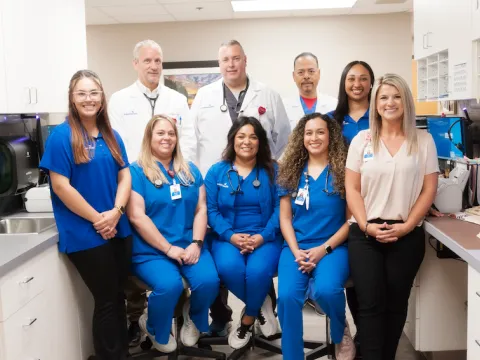- AdventHealth

For women, cervical cancer screenings are an extremely important part of maintaining whole health. In fact, cervical cancer screenings can prevent cervical cancer by detecting pre-cancerous cells and even early stage cancer when it is most treatable.
“Though many women are aware that cervical cancer screenings are recommended, many are understandably confused about when to get them,” said Pelumi Adedayo, MD, of AdventHealth Medical Group OB/GYN at Curtis Parkway. “This is because recommendations and guidelines have changed over the years.”
So, how can these guidelines affect your screening protocol?
We want to help you feel empowered about your health, so here’s a summary of the American Cancer Society’s new cervical cancer screening guidelines and how they may affect your prevention plan.
New Cervical Cancer Screening Guidelines
First, it’s important to point out that these cervical cancer screening guidelines are for women with an average risk and with a cervix. Women at high risk may have a more personalized screening schedule recommended by their doctor. And, for women with a history of a noncancer-related hysterectomy, these recommendations may not apply.
With the new guidelines, two of the most important updates are the type of screening test and what age to start. Instead of the once-a-year Pap smear, it’s now preferred to do a cervical cancer screening every 3 to 5 years based on age group.
The American Cancer Society now recommends a primary HPV test every 5 years. While this is not in widespread use, we recommend the following:
- A combined HPV and Pap test every 5 years for women older than 30, or
- A single pap test every 3 years for women ages 21 to 30.
And for those that have had the HPV vaccine, it’s still important to continue cervical cancer screenings as stated above.
Another important call-out to the new recommendations is for those age 65 and older. Now, those in this age group who have had normal cervical cancer screening results for the last 10 years don’t need further screening.
Why Cervical Cancer Screenings Are Important
Cervical cancer screenings are important because they provide the opportunity to identify pre-cancerous cells and remove them before they turn into cancer. They can also help find cancer in its early stages, when treatments are most successful.
The new recommendations shifted from the pap test to the primary HPV test because, according to the American Cancer Society, almost all cervical cancers are caused by a few specific strains of HPV (human papilloma virus).
While the pap smear looks for precancerous cells in the cervix, the primary HPV screening is better at identifying pre-cancerous cells infected by the types of HPV most likely to cause cervical cancer.
The hope is with widespread HPV vaccination and cervical cancer screening, cervical cancer could be eliminated for all women.
What to Expect at Your Cervical Cancer Screening
Whether you have the primary HPV screening test or the Pap smear screening, the process is relatively the same.
For both tests, you’ll be asked to wear a gown and lay down on an exam table. Then, your health care provider will use a small tool to gently scrape or brush the cervix and collect a small sample of cells. This sample can be used for both the Pap smear test and primary HPV test.
Your provider will give you your results after the lab processes your test(s). The timing can be dependent on what test you take and what lab is used to process it.
Schedule Your Cervical Cancer Screening Today
“When recommendations and guidelines change, it’s a good idea to speak to your women’s care provider,” said Dr. Adedayo. “This is a great time to talk about how the new guidelines may affect your personal cervical cancer screening plan.”
It’s also a good time to talk about other aspects of your whole health and prevention strategies. If you need help, you can find a trusted women’s care provider to guide your journey here.
Recent News

Albit Paoli, MD joins AdventHealth Medical Group Orthopedics & Sports Medicine
AdventHealth is pleased to announce that Albit Paoli, MD, has joined AdventHealth Medical Group Orthopedics & Sports Medicine at Calhoun and AdventHealth Medical Group Orthopedics & Sports Medicine at...

Dr. Phillips Center launches free Frontyard Holiday Festival supported by AdventHealth
The Dr. Phillips Center is launching its first-ever Frontyard Holiday Festival supported by AdventHealth.

AdventHealth expands access to primary care in the heart of DeLand
AdventHealth has opened a new Primary Care+ location in the heart of downtown DeLand, giving residents a simple way to get everyday care close to where life happens. The primary care practice offers...

AdventHealth Rome Turkey Trot brings community together
Over 700 people gathered on Thanksgiving morning for the AdventHealth Rome Turkey Trot, raising $15,000 for Northwest Georgia Hunger Ministries.

Fueling healthy futures for Flagler’s student athletes
Early practices, full class schedules, and evening games can push student athletes to their limits, and proper nutrition is essential to keeping them strong and focused. AdventHealth has introduced...

AHMG Cardiology at Dalton earns nuclear cardiology accreditation
AdventHealth Medical Group Cardiology at Dalton has earned a three-year accreditation in Nuclear Cardiology from the Intersocietal Accreditation Commission (IAC).

When seconds count: How a community of heroes saved one little girl
It was a day like any other — until the phone rang. For Ellison’s mom, that call froze time: “You need to get here right away.”

AdventHealth expands neurology services in West Volusia
Board-certified neurologist Dr. Zarmina Mufti has joined AdventHealth Medical Group and is now caring for patients at AdventHealth, expanding access to expert, whole-person neurological care for...

Central Florida organizations unite to ensure children and families facing food insecurity are fed over holiday break
AdventHealth, Orlando Magic, Florida Citrus Sports and Second Harvest Food Bank team up to support children across Orange, Osceola and Seminole counties.

Pursuing excellence in knee surgery: Colorado Joint Replacement hosts Insall Traveling Fellowship
The international program that brings leading knee surgeons together to learn, collaborate and elevate the future of joint care.

An ocean between them, and a calling that reunited them
After seven years apart, sisters Maricar Olsen and Ermeliza Ortiz were reunited in a place they both now call home. Their journey from the Philippines to Central Florida is a story of faith, family...

‘Definitely a miracle’: Puerto Rican woman receives rare heart-lung transplant in Florida
After only a month of waiting, Ivelese Nieves found herself among fewer than 70 patients nationwide each year who receive a rare, lifesaving operation.
